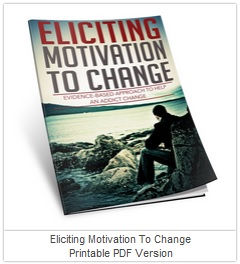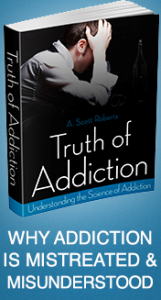 Why most addicts do not need expensive treatment plans
Why most addicts do not need expensive treatment plans
Most Addicts Obtain Sobriety Without Expensive Options
-By A. Scott Roberts
M.S. Rehabilitation Counseling, Addiction Specialist
Repeated research tells us that most addicts who achieved long-term abstinence actually do it on their own without common or luxurious treatment facilities.1, 2
One study examined the prevalent heroin use among soldiers in Vietnam. When the soldiers returned home, they gave up their addiction completely and abruptly.3
When individuals are motivated to make the change, not only is it more successful, but also long-term. Evoking this motivation to change is crucial.
A problem with common addiction treatment is the use of confrontation. Many people have the perception that addicts are always in a state of denial. This is not always the case…
Confrontation actually increases an individual’s resistance to change. Problematic behaviors increase during confrontational periods of intervention as well.4
Just confronting someone to stop drinking actually leads them to drink more, when less confrontation is used, less drinking results.5
The truth is, scaring someone “straight” is ineffective…
Confrontation, the use of power or trying to pound views or truth into someone fails and causes greater problems.
These methods are all too prevalent in some AA, NA and twelve-step programs. Some treatment centers even have a name for it, “hot seat therapy” or “attack therapy.”
According to one researcher, there isn’t a single line of research showing successful clinical outcomes using the above mentioned methods.6
Is it any wonder that AA reports a whopping 80 percent dropout rate in the first year?7
The motivational factors within an addict produces long-term and sustainable change. Sure, an addict can be forced into treatment, but sooner or later he must make the decision.
And scientifically-backed methods can evoke this decision.
The University of New Mexico conducted a study which examined different approaches when confronting alcoholics. Researchers discovered that successful outcomes and long-term sobriety actually stemmed from the level of empathy employed, not confrontation.8 In fact, empathy toward the addicted loved one contributed to long-term positive effects up to 2 years following an intervention!9
Many people do not know about these unusual techniques, that is why the Truth Of Addiction program includes the ebook “Eliciting Motivation To Change.” Click here for a free VIDEO presentation
Click here for a free VIDEO presentation
-A. Scott Roberts
M.S. Rehabilitation Counseling
Addiction Specialist
References
1. Fill more, K.M. (1975). Relationship between specific drinking problems in early adulthood and middle age: An exploratory 20 year follow-up study. Journal of studies on Alcohol, 36, 882-907
2. Sobell, L.C., (1980). Evaluating alchol and drug abuse treatment effectiveness. :Pergamon Press.
3. Robins, L. N., Helzer, J.E., & Davis, D. H. (1975. Narcotic use in Southeast Asia and afterward: An interview study of 898 Vietnam veterans. Archives of General Psychiatry, 32, 955-961
4. Fillmore, K.M. (1975). Relationship between specific drinking problems in early adulthood and middle age: An exploratory 20 year follow-up study. Journal of studies on Alcohol, 36, 882-907
5. Patterson GR, Forgatch MS. Therapist behavior as a determinant for client noncompliance: A paradox for the behavior modifier. Journal of Consulting and Clinical Psychology. 1985;53:846–851.
6. Miller WR, Sovereign RG. The check-up: A model for early intervention in addictive behaviors. In: Løberg T, Miller WR, Nathan PE, Marlatt GA, editors. Addictive behaviors: Prevention and early intervention. Amsterdam: Swets & Zeitlinger; 1989. pp. 219–231.
7. Comments On A.A. Triennial Surveys. Alcoholics Anonymous World Services. December 1990.
8. Miller, W.R. and Rollnick, S. Motivational Interviewing: Preparing People to Change, 2nd ed. NY: Guilford Press, 2002.
9. Valle SK. Interpersonal functioning of alcoholism counselors and treatment outcome. Journal of Studies on Alcohol. 1981;42:783–790.

Holistic Health Warrior
More Thoughts from Mellisa
Question: What are you without an immune system?
Answer: You are dead.
As morbid as it may sound, it’s true. When your immune system is weak you will get sick. When your immune system completely fails you will die.
If I could show you a way to boost your Natural Killer Cells by up to 437%, would you be interested in hearing more? Of course you would.

